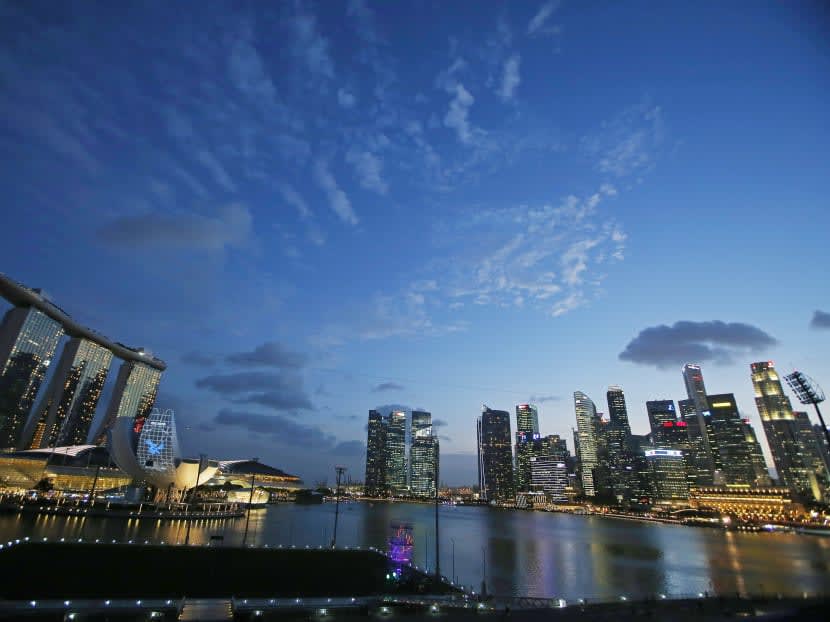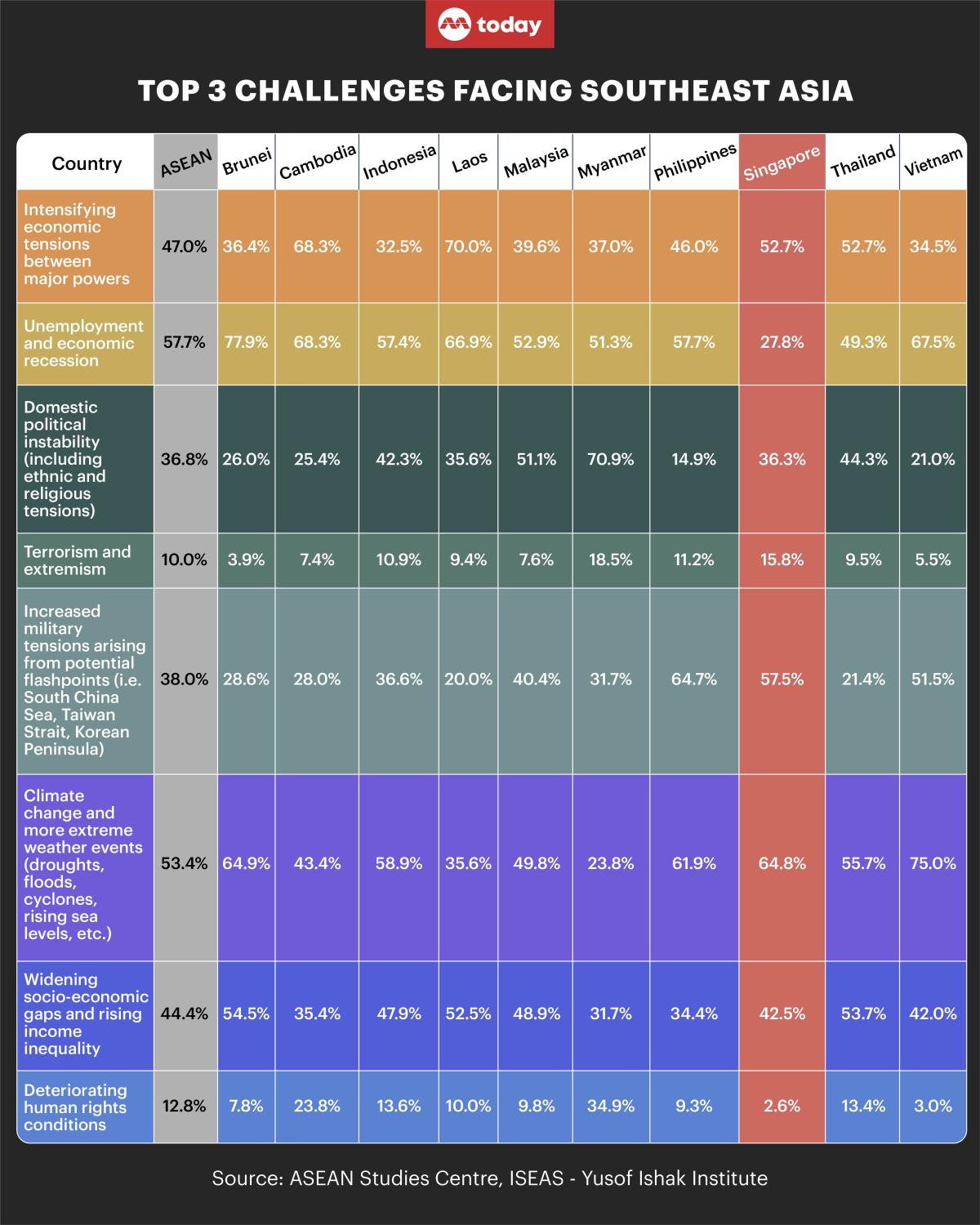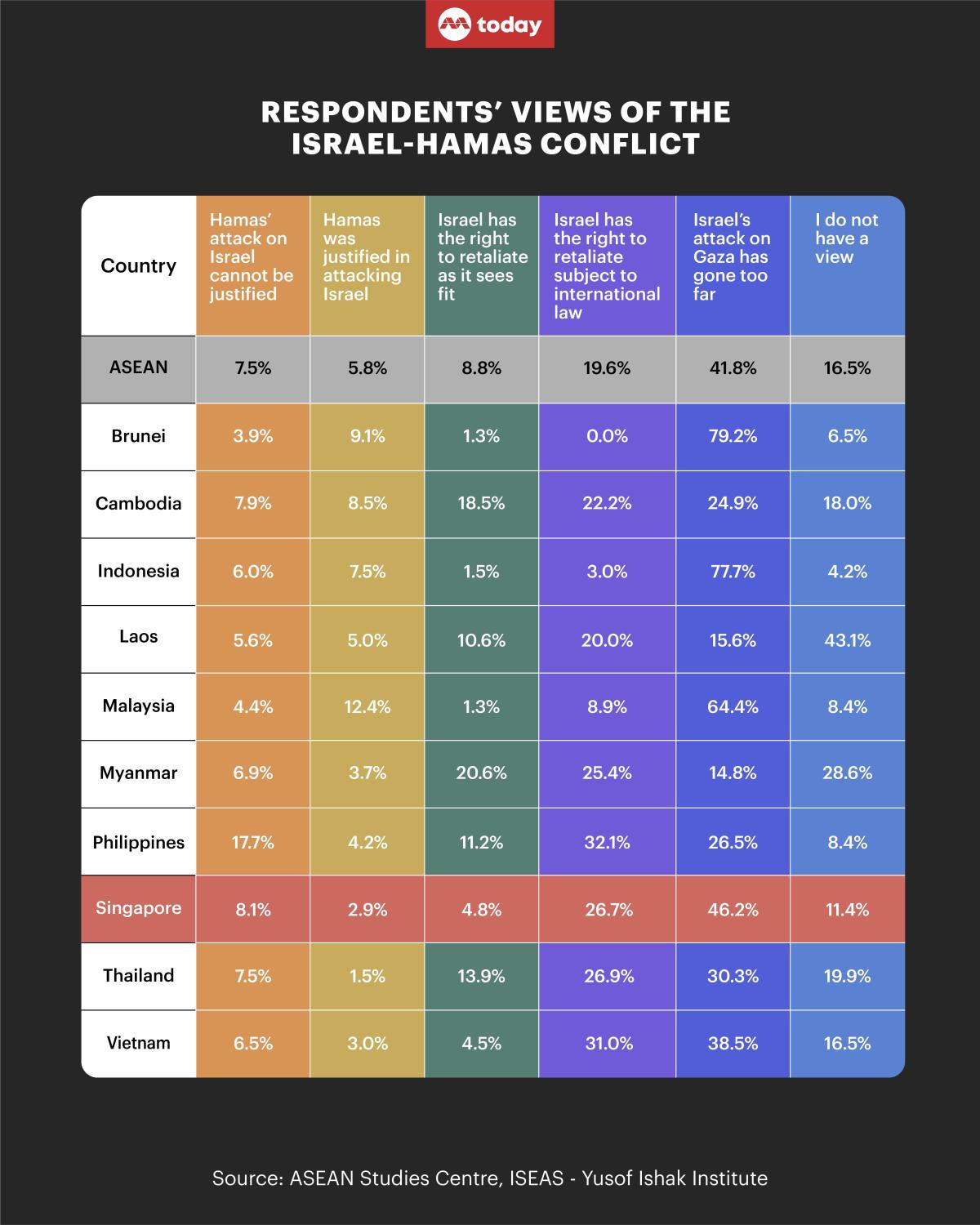5 takeaways from survey of Southeast Asians, including Singapore being top choice of regional country for relocation
SINGAPORE — While a majority of Southeast Asians (57.7 per cent) regard unemployment and economic recession as the region’s most pressing concern, Singapore is an outlier with only 27.8 per cent expressing such fears.


This audio is AI-generated.
- Climate change is Singapore respondents’ top fear (64.8 per cent), which is also among the highest in the region – just behind Vietnam (75 per cent) and Brunei (64.9 per cent), a regional survey found
- If given an opportunity to relocate, Singapore is the top choice (28 per cent) for respondents who prefer to relocate to an Asean member state
- These findings were published on Tuesday (April 2) in the sixth State of Southeast Asia report
- The annual survey by the Iseas-Yusof Ishak Institute gauges the views and perceptions of Southeast Asians on key international affairs and geopolitical developments affecting the region
- Other key takeaways from the report include the fact that the Israel-Hamas conflict is perceived to be the top geopolitical concern, by both regional and Singapore respondents
SINGAPORE — While most other Southeast Asians (57.7 per cent) regard unemployment and economic recession as the region’s most pressing concern, less than a third of Singapore (27.8 per cent) express such fears.
Instead, climate change is Singapore respondents’ top fear (64.8 per cent), which is also among the highest in the region – just behind Vietnam (75 per cent) and Brunei (64.9 per cent), a regional survey has found.
If given an opportunity to relocate, Singapore is the top choice (28 per cent) for respondents who prefer to stay within the region.
These findings were published on Tuesday (April 2) in the sixth State of Southeast Asia report. The annual survey by the Iseas-Yusof Ishak Institute gauges the views and perceptions of Southeast Asians on key international affairs and geopolitical developments affecting the region, to inform or influence policies.
The institute surveyed 1,994 respondents, aged 18 and above, from 10 Southeast Asian countries – Brunei, Cambodia, Indonesia, Laos, Malaysia, Myanmar, the Philippines, Singapore, Thailand and Vietnam – between Jan 3 and Feb 23 this year.
The respondents belonged to one of the following five categories:
- Academia, think-tankers or researchers,
- Private sector representatives,
- Civil society, non-governmental organisations or media representatives,
- Government officials, and
- Regional or international organisations personnel
TODAY looks at five key takeaways from the State of Southeast Asia report:
CLIMATE CHANGE IS SINGAPORE RESPONDENTS’ TOP FEAR
Across the Association of Southeast Asian Nations (Asean), unemployment and economic recession ranks as the number one fear, with more than half (57.7 per cent) of respondents indicating it as the biggest challenge that the region faces.
Respondents also perceive the following to be key regional challenges:
- Climate change and more extreme weather events – such as droughts, floods, cyclones and rising sea levels (53.4 per cent)
- Intensifying economic tensions between major powers (47 per cent)
- Widening socioeconomic gaps and rising income inequality (44.4 per cent)
- Increased military tensions arising from potential flashpoints – such as South China Sea, Taiwan Strait and Korean Peninsula (38 per cent)
- Domestic political instability, including ethnic and religious tensions (36.8 per cent)
- Deteriorating human rights conditions (12.8 per cent)
- Terrorism and extremism (10 per cent)
For Singapore respondents, climate change emerged as the top challenge (64.8 per cent), up from 60.1 per cent in 2023.
On their top concerns about Asean, more than three in four (77 per cent) of all respondents in the region worry that Asean is slow and ineffective, and thus cannot cope with fluid political and economic developments, such that it becomes irrelevant in the new world order.
Singapore respondents, however, indicated the fear of Asean becoming an arena of major power competition, and its member states becoming major power proxies, as their foremost Asean-related concern (81.7 per cent).

SINGAPORE IS THE PREFERRED RELOCATION CHOICE WITHIN SOUTHEAST ASIA
More than a fifth (22.4 per cent) of the survey’s respondents stated a preference for living and working in an Asean country, if given an opportunity to relocate.
The next most popular choices for relocation were Japan (17.1 per cent) and the United States (15.9 per cent).
Among respondents who chose an Asean member state as their preferred relocation choice, Singapore emerged as the top choice (28 per cent), followed by Thailand (13 per cent), Brunei, Indonesia and Vietnam (all three at 9.7 per cent).
Still, most respondents preferred living and working in their home countries if given a choice.
The only exception was Myanmar respondents who favoured relocating to Singapore (35.7 per cent) over living and working in their own country (28.6 per cent).
THE ISRAEL-HAMAS CONFLICT IS SINGAPORE’S TOP GEOPOLITICAL CONCERN
Respondents’ top three geopolitical concerns are the Israel-Hamas conflict (46.5 per cent), aggressive behaviour in the South China Sea (39.9 per cent), and concerns over both the Russia-Ukraine war and global scam operations (39.4 per cent), which tied at third place.
In Singapore, more than half (57.9 per cent) indicated the Israel-Hamas conflict among their top geopolitical concerns.
Singapore respondents worry that the conflict would impact Southeast Asia in the following ways:
- Rise in extremist activities impacting domestic and regional security (41 per cent)
- Erosion of domestic social cohesion due to religious divisions (20.9 per cent)
- Diminished trust in international law and rules-based order (19.4 per cent)
- Greater Asean disunity due to differences in member states’ positions (15 per cent)
Only 3.7 per cent in the country believe that the Israel-Hamas conflict would have no impact on Southeast Asia, compared to 9.9 per cent across all Asean respondents.
Almost half (46.2 per cent) in Singapore also believe that Israel’s attack on Gaza had gone too far.
About two in five (40.7 per cent) in Singapore approved the Government’s position on the Israel-Hamas conflict. More than one in 10 (12.1 per cent) disapproved or strongly disapproved the Government’s position, while 30.8 per cent were neutral.
An online launch and panel discussion of the survey findings was held on Tuesday.
Professor Danny Quah, Li Ka Shing professor in economics and dean at the Lee Kuan Yew School of Public Policy, noted that more than a quarter of a billion Muslims live in the region.
“Almost all of them are deeply affected by what they’re seeing in Gaza — the suffering of innocent Palestinians,” he said.
“This will have a huge long-term impact on ordinary people’s views about the sanctity of international rule of law, and about the preservation of the rules-based order.
“In that sense, it is fundamentally damaging. It’s damaging when article 25 of the UN Charter — that members of the UN agreed to accept and carry out the decisions of the Security Council — is not observed as seriously as it ought to be.
“So I think that looking at the difference between these different geopolitical crises and trying to unpack their impact... what’s going to happen with Israel-Hamas is going to be profound for this part of the world and people’s perceptions about world order.”

CHINA IS THE REGION’S PREVAILING CHOICE IN THE ONGOING US-CHINA RIVALRY
China has maintained its position as the country or regional organisation perceived by respondents to have the most political and strategic influence in Southeast Asia (43.9 per cent), up slightly from 41.5 per cent last year.
Overall, China also edged past the United States to become the prevailing choice if the region were forced to align itself on the ongoing US-China rivalry, the survey found.
Slightly more than half (50.5 per cent) of Asean respondents preferred to align with China, while the rest chose the US.
This is a notable shift in sentiments compared with 2023, where 61.1 per cent of respondents chose to align with the United States over China.
In Singapore, however, China as the preferred alignment choice fell slightly to 38.5 per cent in 2024, compared with 38.9 per cent in 2023.
When asked why they trust China, more than half (54.3 per cent) of respondents here cited its vast economic resources and strong political will to provide global leadership.
When asked why they distrust China, 35 per cent believed China’s economic and military power could be used to threaten Singapore’s interests and sovereignty.
Meanwhile, about four in 10 (39.4 per cent) in Singapore said they trusted the US because they believed its military power is an asset for global peace and security.
Almost half (46.9 per cent) here said they distrusted the US because they were concerned that it was distracted with its internal affairs and thus could not focus on global concerns and issues.
In the event of a crossfire between Beijing and Washington for influence and leadership in Southeast Asia, almost half (45.4 per cent) in Singapore said Asean should enhance its resilience and unity to fend off pressure from the two major powers.
The report elaborated on the shift in sentiment among respondents on the US and China.
“Notably, Indonesia, Laos, and Malaysia which have benefitted significantly from China’s belt and road initiative (BRI) and robust trade and investment relations, witnessed a remarkable increase of more than 20 percentage points in their preference for China compared to 2023,” it stated.
Citing this, panelist Shin Nakayama, editor-in-chief of Japanese media outlet Nikkei Asia, said: “It is still unclear how the BRI will continue to expand in the region.
“With deterioration of the property market in China, I think Chinese banks have been very cautious about making large investments and at the BRI forum in Beijing last year, China itself said it would prioritise quality over quantity in the future projects — so I think China’s investment may have already peaked in the region.
“The other issue is that there are still geopolitical frictions between China and Asean that are not easily resolved, such as the South China Sea territorial issues.
“As long as these two issues remain to be seen, I think it’s not too easy to predict that China can continue to dramatically increase its influence in Asean.”
FEAR THAT TAIWAN-CHINA CONFLICT COULD SEVERELY DISRUPT SUPPLY CHAINS
Southeast Asians also recognise that any hostilities in the Taiwan Strait would have significant implications for the region, given the region’s geographical proximity and economic ties with both China and Taiwan.
Almost half (44.2 per cent) believe that the outbreak of hostilities in the Taiwan Strait would severely disrupt supply chains between China, Taiwan and Southeast Asia. This figure is higher among Singapore respondents, with 50.5 per cent expressing such a concern.
One in four (25 per cent) also believe Southeast Asian countries would be forced to choose between the US and China in the event of hostilities.
Among the 10 Southeast Asian countries surveyed, this fear is most pronounced in Singapore, with 37.7 per cent of respondents here fearing that countries in this region would be forced to choose between the US and China.










